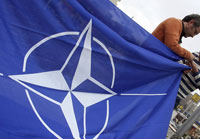Rethinking alliances in a changing world
By David J. Keeling

Alliances can make for strange bedfellows and even stranger conflicts. Whether they be military (NATO, for example), economic (NAFTA), or political (the European Union) alliances are really about control over territory and, more broadly, influence. As conditions change, alliances shift, giving way to new tensions and new opportunities.
NATO’s ongoing geographic rearrangements since the fall of the Soviet Union have been a source of both. European and American tensions with Russia over the nature and reach of the NATO alliance continue to fester. They were further exacerbated recently by the Swedish Liberal Party’s support for NATO membership.
The potential expansion of the NATO alliance to include Sweden is significant in part because of Baltic regional geography. Influence and control over territory continue to be a central pillar of the global geopolitical structure. Control over territory provides access to resources, and resources help countries and alliances to build economic and political power. In turn, such power provides motivation and opportunity to exert greater influence and control over more territory.
This completes a geopolitical cycle and feeds the drive to gain influence and control over more resources. Such a process can be observed playing out across the globe in myriad ways, as airline alliances compete for control over profitable routes, as like-minded countries build economic alliances such as the Central American Free Trade Agreement to maximize economic opportunities, and as democratic societies build military alliances to tackle common threats like global terrorism.
As one of the two states that sit astride the Kattegat and Öresund straits leading into the Baltic Sea, Sweden holds sway over a strategic body of water. Should Finland also join NATO, the Baltic Sea would effectively fall under the influence of the Western Alliance, geographically marginalizing Russia even further and potentially setting in motion a new security challenge on its periphery. The Baltic provides an important connection for Russia to the North Atlantic economies, which is especially critical given Russia’s lack of warm-water ports and its reliance on strategic waterways controlled by other states. In other words, geography matters!
Alliances that change geographic relationships between and among states have enormous political, economic, and social consequences. Russia fears a new containment strategy, where its vulnerable edges along the western, southern, and eastern borderlands are controlled by countries and alliances with which it does not have good relationships. President Medvedev’s recent announcement of a national security strategy that would last through 2020 is significant because it rejects implicitly NATO’s expansion plans. It also rejects any attempt by the NATO alliance to take a global role in security matters that would marginalize Russia or force it into a subordinate role. Pressuring Russia along borders where it no longer has the benefit of buffer states, such as Eastern Europe during the Cold War, may force Medvedev and Putin to seek alliances with countries that are not necessarily friendly to NATO or the U.S.
Alliances can be productive and often create significant benefits for members, but they can also lead to heightened tensions and conflict. Therefore, rethinking both the role and geographic extent of the NATO alliance is more important today than at any time in the recent past. The U.S. would do well to remember that an unequal relationship with Russia likely will lead to no good outcomes.
David Keeling is a member of the American Geographical Society Writer’s Circle and Professor of Geography, Western Kentucky University, Bowling Green, KY 42101-1066, USA. He can be reached at [email protected].
Subscribe to Pravda.Ru Telegram channel, Facebook, RSS!


